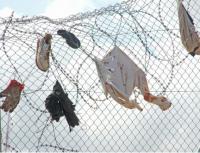 When an "illegal" manage to reach Ceuta, he has to go to the police station. There, he is recorded as having no papers, and it’s left to local authorities to decide what to do with him: it can vary between deportation and receiving a provisional document, which allows the individual to move into the European territory (without, however, having documents allowing him to sign an employment contract). At the door of the police stations, Civil Guard elements often prevent the immigrants to submit to the authorities, handing them to Moroccan militaries.
When an "illegal" manage to reach Ceuta, he has to go to the police station. There, he is recorded as having no papers, and it’s left to local authorities to decide what to do with him: it can vary between deportation and receiving a provisional document, which allows the individual to move into the European territory (without, however, having documents allowing him to sign an employment contract). At the door of the police stations, Civil Guard elements often prevent the immigrants to submit to the authorities, handing them to Moroccan militaries.
To read
14.04.2013 | by Ana Bigotte Vieira and Hugo Maia
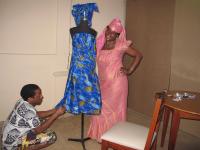 This project is part of a PHD research aiming both to apply, at an academic level, the identity, tradition and fashion-able challenges of African capulana textile into the XXI century fashion and, in parallel, to contribute in a practical way to the improvement of a more equal society through sustainable fashion design, seen as a vehicle for social changings and knowledge empower. Here African tailors are considered agents for the operational creativity of local fashion with this African textile (or sui generis), and therefore agents to develop mechanism between tradition and modernity.
This project is part of a PHD research aiming both to apply, at an academic level, the identity, tradition and fashion-able challenges of African capulana textile into the XXI century fashion and, in parallel, to contribute in a practical way to the improvement of a more equal society through sustainable fashion design, seen as a vehicle for social changings and knowledge empower. Here African tailors are considered agents for the operational creativity of local fashion with this African textile (or sui generis), and therefore agents to develop mechanism between tradition and modernity.
City
27.03.2013 | by Sofia Vilarinho
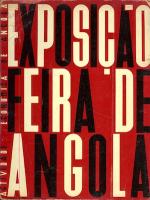 Two years before the Exhibition of the Portuguese World (“Exposição de Mundo Português”), a very large Exhibition-Fair was held in Luanda, that did not go down in colonial history. Its was meant to display the economic development of Angola in an "expressive and comprehensive documentary", rather than exalt the regime's historicist programme and imperial mystique - the norm with colonial exhibitions, such as the Historical Exhibition of the Occupation (“Exposição Histórica da Ocupação”) held in 1937, in the Eduardo VII Park in Lisbon.
Two years before the Exhibition of the Portuguese World (“Exposição de Mundo Português”), a very large Exhibition-Fair was held in Luanda, that did not go down in colonial history. Its was meant to display the economic development of Angola in an "expressive and comprehensive documentary", rather than exalt the regime's historicist programme and imperial mystique - the norm with colonial exhibitions, such as the Historical Exhibition of the Occupation (“Exposição Histórica da Ocupação”) held in 1937, in the Eduardo VII Park in Lisbon.
I'll visit
23.03.2013 | by Alexandre Pomar
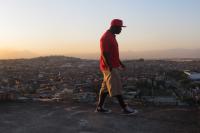 The booming economic juggernaut in Brazil has transformed lives. It has also acted as a beacon attracting migrants from all over the world, including the former Portuguese colony of Angola. Expecting to find a vast multicultural embrace, Angolan immigrant Badharo instead finds barriers and even racism in Rio. So he turns to music as a way to express his disappointment, pain and outrage.
Set against the tragic death of a young Angolan student, we experience the frustrations Badharo and his family face as their Brazilian dreams encounter a very different reality.
The booming economic juggernaut in Brazil has transformed lives. It has also acted as a beacon attracting migrants from all over the world, including the former Portuguese colony of Angola. Expecting to find a vast multicultural embrace, Angolan immigrant Badharo instead finds barriers and even racism in Rio. So he turns to music as a way to express his disappointment, pain and outrage.
Set against the tragic death of a young Angolan student, we experience the frustrations Badharo and his family face as their Brazilian dreams encounter a very different reality.
Afroscreen
06.02.2013 | by Juliana Borges and Fernanda Polacow
 These lives can be affected without being subject to a "duel", because precariousness is necessary for the protection of other individuals’ lifestyle or life. So we cannot think about the body without considering the conditions that make it vulnerable to precariousness, which are issues relating to gender, origin, sexual orientation, sexuality, class, race, cultural difference, disease, disability, complexion, or age. In this sense, we aim to insist less on identity politics or claims (and their misleading subversion), and more on precariousness and its distribution of difference and exploitation in the maps of contemporary power.
These lives can be affected without being subject to a "duel", because precariousness is necessary for the protection of other individuals’ lifestyle or life. So we cannot think about the body without considering the conditions that make it vulnerable to precariousness, which are issues relating to gender, origin, sexual orientation, sexuality, class, race, cultural difference, disease, disability, complexion, or age. In this sense, we aim to insist less on identity politics or claims (and their misleading subversion), and more on precariousness and its distribution of difference and exploitation in the maps of contemporary power.
Body
06.02.2013 | by Buala
 The question is rather something else: What about other thinkers who operate outside this European philosophical pedigree, whether they practice their thinking in the European languages they have colonially inherited or else in their own mother tongues - in Asia, in Africa, in Latin America, thinkers that have actually earned the dignity of a name, and perhaps even the pedigree of a "public intellectual" not too dissimilar to Hannah Arendt, Jean-Paul Sartre, and Michel Foucault that in this piece on Al Jazeera are offered as predecessors of Zizek?
The question is rather something else: What about other thinkers who operate outside this European philosophical pedigree, whether they practice their thinking in the European languages they have colonially inherited or else in their own mother tongues - in Asia, in Africa, in Latin America, thinkers that have actually earned the dignity of a name, and perhaps even the pedigree of a "public intellectual" not too dissimilar to Hannah Arendt, Jean-Paul Sartre, and Michel Foucault that in this piece on Al Jazeera are offered as predecessors of Zizek?
To read
17.01.2013 | by Hamid Dabashi
 Vela 691 is the code name of the US satellite that detected the nuclear blast performed by South Africa on the 22nd of September in 1979. The test was conducted in the South Atlantic off the cost of Antarctica. It's also the name of a new piece Victor Gama composed by invitation from the Chicago Symphony Orchestra. The piece was premiered during the concert series MusicNOW at Harris Theatre in Chicago on the 5th of March 2012 and was a result of an invitation from composers-in-residence Mason Bates and Anna Clyne.
Vela 691 is the code name of the US satellite that detected the nuclear blast performed by South Africa on the 22nd of September in 1979. The test was conducted in the South Atlantic off the cost of Antarctica. It's also the name of a new piece Victor Gama composed by invitation from the Chicago Symphony Orchestra. The piece was premiered during the concert series MusicNOW at Harris Theatre in Chicago on the 5th of March 2012 and was a result of an invitation from composers-in-residence Mason Bates and Anna Clyne.
I'll visit
07.01.2013 | by vários
 tectonik:TOMBWA is a project initiated by Victor Gama in the desert of Namibe, Angola, in 2006 with the aim of reconstructing and interpret professor Augusto Zita's research thesis “An anthropology of Utopia: formation of Utopian identities”. The project is based on his fragmented notes, and is intended to resurface his thoughts, concepts and refletions. For that aim Gama started an archive of some of the main items pointed out by prof. Augusto in his notes such as recordings of sounds collected with a specific device in the Namibe desert, photografs and videos of several features along the road from Namibe to Tombwa, as well as a collection of objects found laying on the ground, different types of sands, dryed leaves of plants and many other items.
tectonik:TOMBWA is a project initiated by Victor Gama in the desert of Namibe, Angola, in 2006 with the aim of reconstructing and interpret professor Augusto Zita's research thesis “An anthropology of Utopia: formation of Utopian identities”. The project is based on his fragmented notes, and is intended to resurface his thoughts, concepts and refletions. For that aim Gama started an archive of some of the main items pointed out by prof. Augusto in his notes such as recordings of sounds collected with a specific device in the Namibe desert, photografs and videos of several features along the road from Namibe to Tombwa, as well as a collection of objects found laying on the ground, different types of sands, dryed leaves of plants and many other items.
I'll visit
05.01.2013 | by vários
 The border is understood here not as a groove, but as a program “whose operation invests and covers the whole set of social relations”; as a police force specialized in separating who is from who is not; as an operation permanently being reiterated in space, academic disciplines, knowledge, and in our own acts; as a line that crosses us all, and which it is important to talk about.
The border is understood here not as a groove, but as a program “whose operation invests and covers the whole set of social relations”; as a police force specialized in separating who is from who is not; as an operation permanently being reiterated in space, academic disciplines, knowledge, and in our own acts; as a line that crosses us all, and which it is important to talk about.
Games Without Borders
27.12.2012 | by Ana Bigotte Vieira
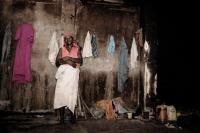 The "resource curse" is a term used to characterize the risks faced by poor countries where natural resources that are object of international greed are discovered. The promise of abundance arising from the enormous commercial value of resources and from the investments required to achieve it is so convincing that it starts to influence the pattern of economic, social, political, and cultural development.
The "resource curse" is a term used to characterize the risks faced by poor countries where natural resources that are object of international greed are discovered. The promise of abundance arising from the enormous commercial value of resources and from the investments required to achieve it is so convincing that it starts to influence the pattern of economic, social, political, and cultural development.
To read
06.12.2012 | by Boaventura de Sousa Santos
 Travel in Monica de Miranda’s imagery becomes a metaphor for what Walter Mignolo calls ‘the colonial wound’: as a way to explore her multiple movements and those of her family through places linked by a common colonial matrix she builds her own emotional map in a variety of mediums. It could be argued that the stations chosen for her transit suggest a reflection on decolonization that in the Zapatistas’ terms would carry us towards a world that would fit many worlds: a proposal for a pluriversal -as in opposition to uni-versal - reading of reality.
Travel in Monica de Miranda’s imagery becomes a metaphor for what Walter Mignolo calls ‘the colonial wound’: as a way to explore her multiple movements and those of her family through places linked by a common colonial matrix she builds her own emotional map in a variety of mediums. It could be argued that the stations chosen for her transit suggest a reflection on decolonization that in the Zapatistas’ terms would carry us towards a world that would fit many worlds: a proposal for a pluriversal -as in opposition to uni-versal - reading of reality.
I'll visit
27.11.2012 | by Gabriela Salgado
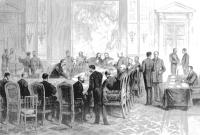 Thus, far from being characteristic of colonial continuities before former European colonies - or what the Peruvian Anibal Quijano (1992) dubbed coloniality of power and knowledge, we are witnessing an Israeli colonialism that, contrary to what is preached is not based on defense and state security before the neighbors and "enemies" in Arabic or enlargement of its territory, but the regional dominance of a natural resource more precious than oil and that can feed the emergence of new colonial regimes in XXI Century: Water.
Thus, far from being characteristic of colonial continuities before former European colonies - or what the Peruvian Anibal Quijano (1992) dubbed coloniality of power and knowledge, we are witnessing an Israeli colonialism that, contrary to what is preached is not based on defense and state security before the neighbors and "enemies" in Arabic or enlargement of its territory, but the regional dominance of a natural resource more precious than oil and that can feed the emergence of new colonial regimes in XXI Century: Water.
To read
20.11.2012 | by Odair Bartolomeu Varela
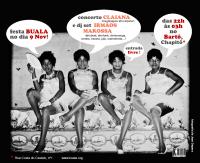 Thinking about the body is a strategic requirement, a way to discuss the normative processes of exclusion, naturalization and production, setting new ways to be in the world, new affections, to expand the horizon of the reasoning about the body. The idea is to insist less in the identity politics nor the identity pretensions (and its deceiver subversion) and more on precariousness and the way it deals with difference as well as the way the maps of power are exploited.
Thinking about the body is a strategic requirement, a way to discuss the normative processes of exclusion, naturalization and production, setting new ways to be in the world, new affections, to expand the horizon of the reasoning about the body. The idea is to insist less in the identity politics nor the identity pretensions (and its deceiver subversion) and more on precariousness and the way it deals with difference as well as the way the maps of power are exploited.
To read
06.11.2012 | by Buala
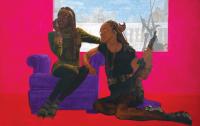 The first time I saw Rainha Nzinga of Matamba, I was walking across Luanda's Kinaxixi square with a friend. We stopped to admire the vast bronze tribute to the seventeenth-century Mbundu monarch, who not only fought Portuguese armies, but caused consternation among her own people and played a significant role in developing the Angolan slave trade. I was immediately impressed by the statue, although my friend, an Angolan journalist, was less so. 'In real life, you'd have seen her breasts,' he said, 'but they've been covered up to appease our modern sensibilities.'
The first time I saw Rainha Nzinga of Matamba, I was walking across Luanda's Kinaxixi square with a friend. We stopped to admire the vast bronze tribute to the seventeenth-century Mbundu monarch, who not only fought Portuguese armies, but caused consternation among her own people and played a significant role in developing the Angolan slave trade. I was immediately impressed by the statue, although my friend, an Angolan journalist, was less so. 'In real life, you'd have seen her breasts,' he said, 'but they've been covered up to appease our modern sensibilities.'
Face to face
06.11.2012 | by Lara Pawson
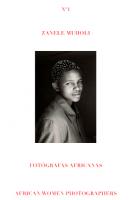 The African continent for a long time was totally overlooked in the annals of the history of photography. Indeed, Africa only appeared timidly on the international horizon or rather to arouse certain interest in the West around the early 1990s. Among other important events of the time that contributed towards this growing interest figures the African Photography Biennial in Mali, also known as the African Encounters of Photography. It was precisely that framework that gave rise to this collection that wishes to concentrate on the gaze of some of the women participating in the biennial. Our collection has two main objectives: firstly, to forestage African photography on the global scenario, in other words, to make it part of the whole and not merely consider it as part of the rest; and, secondly, to act out the will to endow African women photographers more visibility. This collection aims to break down the barriers of this double invisibility by looking at the narrative constructs of these women and thus multiplying the existing ways of seeing in an attempt to broaden and enhance our own perspectives.
The African continent for a long time was totally overlooked in the annals of the history of photography. Indeed, Africa only appeared timidly on the international horizon or rather to arouse certain interest in the West around the early 1990s. Among other important events of the time that contributed towards this growing interest figures the African Photography Biennial in Mali, also known as the African Encounters of Photography. It was precisely that framework that gave rise to this collection that wishes to concentrate on the gaze of some of the women participating in the biennial. Our collection has two main objectives: firstly, to forestage African photography on the global scenario, in other words, to make it part of the whole and not merely consider it as part of the rest; and, secondly, to act out the will to endow African women photographers more visibility. This collection aims to break down the barriers of this double invisibility by looking at the narrative constructs of these women and thus multiplying the existing ways of seeing in an attempt to broaden and enhance our own perspectives.
To read
24.09.2012 | by Masasam
The album is titled “Ex-Combatentes” (Ex-Combatants), which happens also to be the name of the street he lives on in Luanda, but the music in sound and lyrics has little to do with war. Unless one thinks of war in the widest sense – war with the self, war with family, neighbors, friends, etc.
Stages
07.09.2012 | by Marissa Moorman
 He is Moroccan and French at the same time. He writes in French and nowadays looks at the social and cultural transformations in the countries of the Arab Spring. And expects the new France will adopt a different attitude relating to dictatorships.
With his two passports and the belief in the writer’s role of “criticizing, denunciating, and intervening”, Tahar Ben Jelloun was at Calouste Gulbenkian Foundation at the end of June for a conference in which his aim was “explaining the Arab Spring”.
He is Moroccan and French at the same time. He writes in French and nowadays looks at the social and cultural transformations in the countries of the Arab Spring. And expects the new France will adopt a different attitude relating to dictatorships.
With his two passports and the belief in the writer’s role of “criticizing, denunciating, and intervening”, Tahar Ben Jelloun was at Calouste Gulbenkian Foundation at the end of June for a conference in which his aim was “explaining the Arab Spring”.
Face to face
03.09.2012 | by Sofia Lorena
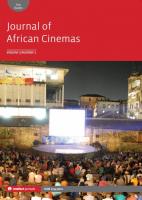 Substantial research has been dedicated to post-colonial productions in African Studies, Postcolonial Studies and Film Studies. Francophone and Anglophone film productions have been extensively assessed in academic writings; however there is a lack of critical research on the subject of Lusophone cinemas and co-productions. This special issue of Journal of African Cinemas intends to address this shortfall in academic work by presenting a critical and informative body of research on the subject.
Substantial research has been dedicated to post-colonial productions in African Studies, Postcolonial Studies and Film Studies. Francophone and Anglophone film productions have been extensively assessed in academic writings; however there is a lack of critical research on the subject of Lusophone cinemas and co-productions. This special issue of Journal of African Cinemas intends to address this shortfall in academic work by presenting a critical and informative body of research on the subject.
Afroscreen
24.08.2012 | by Alessandra Meleiro
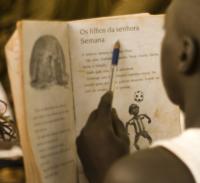 The creole, as a language, arose from the communication needs of colonized societies with the colonizer regime, being the language of national unity in many countries. Considering their own mother tongues as little useful, colonized societies recurred to the linguistic knowledge of the imposed model to build a simpler form of vehicular language, which we nowadays call creole.
The creole, as a language, arose from the communication needs of colonized societies with the colonizer regime, being the language of national unity in many countries. Considering their own mother tongues as little useful, colonized societies recurred to the linguistic knowledge of the imposed model to build a simpler form of vehicular language, which we nowadays call creole.
To read
23.08.2012 | by Catarina Laranjeiro and Jorge Filipe
 This spurs the women to defiantly band together to undertake a real revolutionary action and assert their independence from their "liberators." An evocative exposé of a little-known chapter in the contemporary history of Mozambique, Virgin Margarida is a dramatic and inspiring elegy to the insurgent spirit of women across nations, histories and cultures.
This spurs the women to defiantly band together to undertake a real revolutionary action and assert their independence from their "liberators." An evocative exposé of a little-known chapter in the contemporary history of Mozambique, Virgin Margarida is a dramatic and inspiring elegy to the insurgent spirit of women across nations, histories and cultures.
Afroscreen
22.08.2012 | by vários